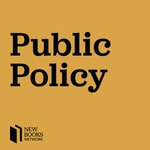New Books in National Security – Details, episodes & analysis
Podcast details
Technical and general information from the podcast's RSS feed.


Recent rankings
Latest chart positions across Apple Podcasts and Spotify rankings.
Apple Podcasts
🇺🇸 USA - socialSciences
13/08/2025#99🇺🇸 USA - socialSciences
12/08/2025#77🇺🇸 USA - socialSciences
11/08/2025#68🇩🇪 Germany - socialSciences
08/08/2025#92🇨🇦 Canada - socialSciences
07/08/2025#95🇩🇪 Germany - socialSciences
07/08/2025#90🇨🇦 Canada - socialSciences
06/08/2025#75🇩🇪 Germany - socialSciences
06/08/2025#73🇨🇦 Canada - socialSciences
05/08/2025#54🇩🇪 Germany - socialSciences
05/08/2025#55
Spotify
No recent rankings available
Shared links between episodes and podcasts
Links found in episode descriptions and other podcasts that share them.
See all- https://twitter.com/bucephalus424
17 shares
RSS feed quality and score
Technical evaluation of the podcast's RSS feed quality and structure.
See allScore global : 53%
Publication history
Monthly episode publishing history over the past years.
Terrence G. Peterson, "Revolutionary Warfare: How the Algerian War Made Modern Counterinsurgency" (Cornell UP, 2024)
Episode 104
samedi 7 septembre 2024 • Duration 49:23
David H. Price, "The American Surveillance State: How the US Spies on Dissent" (Pluto Press, 2022)
Episode 11
mercredi 4 septembre 2024 • Duration 54:34
Jeremy Black, "Rethinking Geopolitics" (Indiana UP, 2024)
Episode 102
samedi 17 août 2024 • Duration 39:37
Andrew Quilty, "August in Kabul: America's Last Days in Afghanistan" (Bloomsbury, 2023)
Episode 181
lundi 24 juillet 2023 • Duration 38:16
Tarek Younis, "The Muslim, State, and Mind: Psychology in Times of Islamophobia" (Sage, 2022)
Episode 207
dimanche 23 juillet 2023 • Duration 35:49
Penny M. Von Eschen, "Paradoxes of Nostalgia: Cold War Triumphalism and Global Disorder Since 1989" (Duke UP, 2022)
Episode 73
mercredi 19 juillet 2023 • Duration 01:27:26
Sofya Aptekar, "Green Card Soldier: Between Model Immigrant and Security Threat" (MIT Press, 2023)
Episode 228
vendredi 14 juillet 2023 • Duration 01:01:26
Michael O'Hanlon, "Military History for the Modern Strategist: America's Major Wars Since 1861" (Brookings, 2023)
Episode 177
samedi 1 juillet 2023 • Duration 35:29
Samuel Helfont, "Iraq Against the World: Saddam, America, and the Post-Cold War Order" (Oxford UP, 2023)
Episode 72
vendredi 30 juin 2023 • Duration 01:19:49
Chris Millington, "The Invention of Terrorism in France, 1904-1939" (Stanford UP, 2023)
Episode 113
jeudi 22 juin 2023 • Duration 01:00:52









